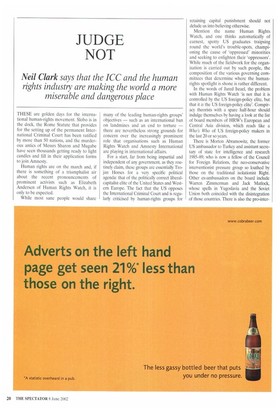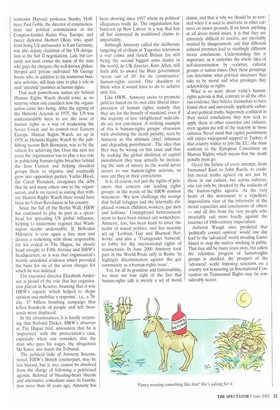JUDGE NOT
Neil Clark says that the ICC and the human
rights industry are making the world a more miserable and dangerous place
THESE are golden days for the international human-rights movement. Slobo is in the dock, the Rome Statute that provides for the setting up of the permanent International Criminal Court has been ratified by more than 50 nations, and the murderous antics of Messrs Sharon and Mugabe have seen thousands getting ready to light candles and fill in their application forms to join Amnesty.
Human rights are on the march and, if there is something of a triumphalist air about the recent pronouncements of prominent activists such as Elizabeth Andersen of Human Rights Watch, it is only to be expected.
While most sane people would share many of the leading human-rights groups' objectives — such as an international ban on landmines and an end to torture — there are nevertheless strong grounds for concern over the increasingly prominent role that organisations such as Human Rights Watch and Amnesty International are playing in international affairs.
For a start, far from being impartial and independent of any government, as they routinely claim, these groups are essentially Trojan Horses for a very specific political agenda: that of the politically correct liberalcapitalist elite of the United States and Western Europe. The fact that the US opposes the International Criminal Court and is regularly criticised by human-rights groups for retaining capital punishment should not delude us into believing otherwise.
Mention the name Human Rights Watch, and one thinks automatically of earnest, spotty US graduates traipsing round the world's trouble-spots, championing the cause of 'oppressed' minorities and seeking to enlighten their 'oppressors'. While much of the fieldwork for the organisation is carried out by such people, the composition of the various governing committees that determine where the humanrights spotlight is shone is rather different.
In the words of Jared Israel, the problem with Human Rights Watch 'is not that it is controlled by the US foreign-policy elite, but that it is the US foreign-policy elite'. Conspiracy theorists with a spare half-hour should indulge themselves by having a look at the list of board members of HRW's European and Central Asia division, which reads like a WhO'S Who of US foreign-policy makers in the last 20 or so years.
There is Morton Abramowitz, the former US ambassador to Turkey and assistant secretary of state for intelligence and research 1985-89, who is now a fellow of the Council for Foreign Relations, the neo-conservative interventionist pressure group so loathed by those on the traditional isolationist Right. Other ex-ambassadors on the board include Warren Zimmerman and Jack Matlock, whose spells in Yugoslavia and the Soviet Union both coincided with the disintegration of those countries. There is also the pro-inter
ventionist Harvard professor Stanley Hoffman: Paul Goble, the director of communications and political commentator at the Congress-funded Radio Free Europe; and career diplomat Herbert Okun, who, apart from being US ambassador to East Germany, was also deputy chairman of the US delegation at the Salt II negotiations. Last, but certainly not least, comes the name of the man who pays the cheques, the well-known philanthropist and 'private individual' Mr George Soros. who, in addition to his numerous business activities, still finds time to play a role in such 'altruistic' pastimes as human rights.
That such powerhouse names are behind Human Rights Watch should come as no surprise when one considers how the organisation came into being. After the signing of the Helsinki Accords in 1975, the US was understandably keen to use the issue of human rights as a way of weakening the Soviet Union and its control over Eastern Europe. Human Rights Watch, set up in 1978 as Helsinki Rights Watch by the publishing tycoon Bob Bernstein, was to be the vehicle for achieving this. Over the next ten years the organisation was to play a key role in publicising human-rights breaches behind the Iron Curtain and helping dissident groups there to organise and eventually grow into opposition parties. Vaclav Havel, the Czech President, recognises the debt that he and many others owe to the organisation, and is on record as stating that without Human Rights Watch there would have been no Velvet Revolution in his country.
Since the fall of the Berlin Wall, HRW has continued to play its part as a spearhead for spreading US global influence, helping to undermine regimes that Washington deems undesirable. If Slobodan Milosevic is ever again a free man and desires a reckoning with those responsible for his ordeal in The Hague, he should head straight to Fifth Avenue and HRW's headquarters, as it was that organisation's mainly anecdotal evidence which provided the basis for six of the seven charges for which he was indicted.
The executive director Elizabeth Andersen is proud of the role that her organisation played in Kosovo, boasting that it was HRW's reports 'which helped to shape opinion and mobilise a response', i.e., a 78day, $7 billion bombing campaign that killed hundreds of people and left thousands more displaced.
In the circumstances, it is hardly surprising that Richard Dicker. HRW's observer at The Hague trial, announces that he is 'impressed' with the prosecution's case, especially when one considers that the man who pays his wages, the ubiquitous Mr Soros, also funds the Tribunal.
The political links of Amnesty International, HRW's British counterpart, may be less blatant, but it, too, cannot be absolved from the charge of following a politicised agenda. Beloved of bleeding-heart liberals and alternative comedians since its foundation more than 40 years ago, Amnesty has been showing since 1997 where its political allegiances really lie. The organisation has buttered up New Labour in a way that has all but destroyed its traditional claims to impartiality.
Although Amnesty called the deliberate targeting of civilians at Yugoslav television a war crime and slated Britain for still being the second biggest arms dealer in the world, its UK director, Kate Allen, still feels able to award the Blair government 'seven out of 10' for its 'constructive' human-rights record. One shudders to think what it would have to do to achieve only five.
Like HRW, Amnesty seeks to promote policies based on its own elite liberal interpretation of human rights; namely that they are for the benefit of mankind, even if the majority of less 'enlightened' individuals are not convinced. A striking example of this is human-rights groups' obsession with abolishing the death penalty, seen by Amnesty as 'the ultimate cruel, inhuman and degrading punishment'. The idea that they may be wrong on this issue and that by seeking the global abolition of capital punishment they may actually be increasing the sum of misery in the world never occurs to our human-rights activists, so sure are they in their convictions.
It is, of course, not just the rights of prisoners that concern our leading rights groups; in the words of the HRW mission statement: 'We now challenge the wrongs that befall refugees and the internally displaced, women, children, workers, gay men and lesbians.' Unemployed heterosexuals seem to have been missed out somewhere. Amnesty, too, has been keen to enter the realm of sexual politics, and has recently set up 'Lesbian, Gay and Bisexual Networks' and also a Transgender Network' to lobby for the international rights of transsexuals. In June 2000 Amnesty took part in the World Pride rally in Rome `to highlight discrimination against the gay community as a human-rights issue'.
Yet, for all its grandeur and fashionability, we must not lose sight of the fact that human-rights talk is merely a set of moral
claims, and that is why we should be so worried when it is used to intervene in other cultures on minor grounds. If we know anything at all about moral issues, it is that they are extremely difficult to resolve, are inevitably marked by disagreement, and that different cultural premises lead to startlingly different moral conclusions. Understanding this is important. as it underlies the whole idea of self-determination by societies, cultural groups or nation states. Only these groupings can determine what political structures they take to be moral and what privileges they acknowledge as rights.
What is so scary about today's humanrights activists is that, contrary to all the obvious evidence, they believe themselves to have found clear and universally applicable cultural and political truths. Supremely confident in their moral conclusions, they now seek to apply them in other countries and cultures, even against the will of the majority in those cultures. Never mind that capital punishment still enjoys widespread support in Turkey; if that country wishes to join the EU, she must conform to the European Convention on Human Rights, which means that the death penalty must go.
Given the failure of every attempt, from Immanuel Kant to John Rawls, to establish moral truths agreed on not just by those in our culture, but across cultures, one can only be shocked by the audacity of the human-rights agenda. At the very heart of the movement is a repellent, imperialistic view of the inferiority of the moral capacities and conclusions of others — and all this from the very people who invariably rail most loudly against the excesses of 19th-century imperialism.
Auberon Waugh once predicted that 'politically correct opinion' would one day lead to the 'advanced' world invading Easter Island to stop the natives smoking in public. That may still be many years away, but unless the relentless progress of human-rights groups is checked, the prospect of the 'advanced' world imposing sanctions on a country not honouring an International Convention on Transsexual Rights may be considerably nearer.























































































 Previous page
Previous page